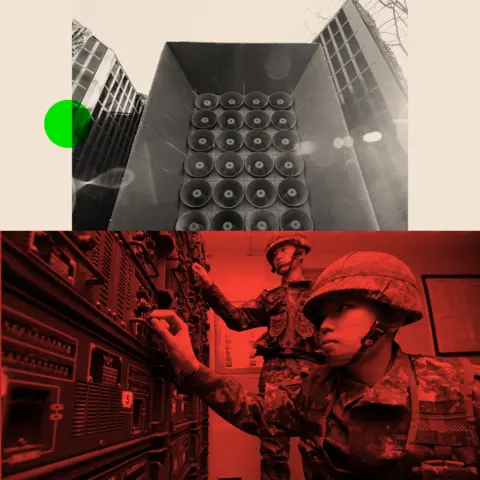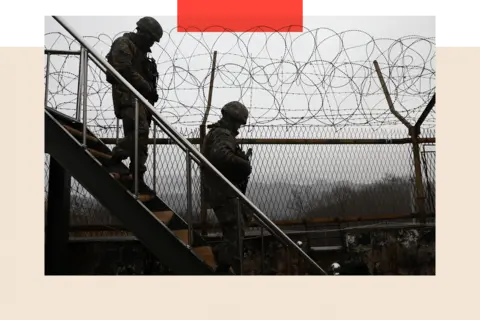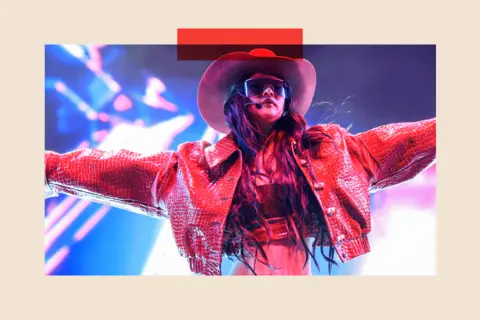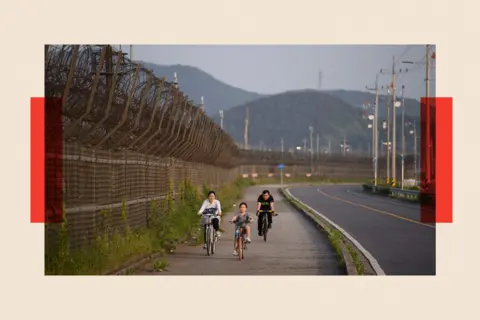North and South Korea are in an underground warfare

Seoul correspondent
 BBC
BBCTake heed to Jean learn this text
The border between North and South Korea is swamped with layers of dense barbed-wire fencing and lots of of guard posts. However dotted amongst them is one thing much more uncommon: large, inexperienced camouflaged audio system.
As I stood wanting into the North one afternoon final month, one of many audio system started blasting South Korean pop songs interspersed with subversive messages. “Once we journey overseas, it energises us”, a lady’s voice boomed out throughout the border – an apparent slight given North Koreans are usually not allowed to depart the nation.
From the North Korean aspect, I may faintly hear army propaganda music, as its regime tried to drown out the inflammatory broadcasts.
North and South Korea are technically nonetheless at warfare, and though it has been years since both aspect shelled the opposite, the 2 sides are preventing on a extra delicate entrance: a warfare of knowledge.
 Getty Photos
Getty PhotosThe South tries to get data into the North, and North Korea’s chief Kim Jong Un tries furiously to dam it, as he makes an attempt to protect his folks from exterior data.
North Korea is the one nation on the planet the web has not penetrated. All TV channels, radio stations and newspapers are run by the state.
“The explanation for this management is that a lot of the mythology across the Kim household is made up. Plenty of what they inform folks is lies,” says Martyn Williams, a senior fellow on the Washington-based Stimson Heart, and an skilled in North Korean expertise and data.
Expose these lies to sufficient folks and the regime may come crumbling down, is how the pondering in South Korea goes.
The loudspeakers are one instrument utilized by the South Korean authorities, however behind the scenes a extra refined underground motion has flourished.
A small variety of broadcasters and non-profit organisations transmit data into the nation in the dark on brief and medium radio waves, so North Koreans can tune in to hear in secret.
 Getty Photos
Getty Photos1000’s of USB sticks and micro-SD playing cards are additionally smuggled over the border each month loaded with overseas data – amongst them, South Korean movies, TV dramas, and pop songs, in addition to information, all designed to problem North Korean propaganda.
However now these working within the subject worry that North Korea is gaining the higher hand.
Not solely is Kim cracking down onerous on these caught with overseas content material, however the way forward for this work might be in jeopardy. A lot of it’s funded by the US authorities, and has been hit by US President Donald Trump’s current help cuts.
So the place does this depart either side of their longstanding data warfare?
Smuggling pop songs and TV dramas
Each month, a staff at Unification Media Group (UMG), a South Korean non-profit organisation, sift via the newest information and leisure choices to place collectively playlists that they hope will resonate with these within the North.
They then load them onto gadgets, that are categorised in keeping with how dangerous they’re to view. On low-risk USBs are South Korean TV dramas and pop songs – lately they included a Netflix romance collection When Life Give You Tangerines, and a success from standard South Korean singer and rapper Jennie.
Excessive-risk choices embody what the staff calls “training programmes” – data to show North Koreans about democracy and human rights, the content material Kim is believed to worry essentially the most.
The drives are then despatched to the Chinese language border, the place UMG’s trusted companions carry them throughout the river into North Korea at big danger.
 AFP by way of Getty Photos
AFP by way of Getty PhotosSouth Korean TV dramas could appear innocuous, however they reveal a lot about extraordinary life there – folks residing in high-rise residences, driving quick vehicles and consuming at upmarket eating places. It highlights each their freedom and the way North Korea is a few years behind.
This challenges one in every of Kim’s largest fabrications: that these within the South are poor and miserably oppressed.
“Some [people] inform us they cried whereas watching these dramas, and that they made them take into consideration their very own desires for the very first time”, says Lee Kwang-baek, director of UMG.
It’s tough to know precisely how many individuals entry the USBs, however testimonies from current defectors appear to counsel the knowledge is spreading and having an impression.
“Most up-to-date North Korean defectors and refugees say it was overseas content material that motivated them to danger their lives to flee”, says Sokeel Park, whose organisation Liberty in North Korea works to distribute this content material.
There isn’t any political opposition or recognized dissidents in North Korea, and gathering to protest is just too harmful – however Mr Park hopes some will probably be impressed to hold out particular person acts of resistance.
An escape from North Korea
Kang Gyuri, who’s 24, grew up in North Korea, the place she ran a fishing enterprise. Then in late 2023, she fled to South Korea by boat.
Watching overseas TV reveals partly impressed her to go, she says. “I felt so suffocated, and I out of the blue had an urge to depart.”
Once we met in a park on a sunny afternoon in Seoul final month, she reminisced about listening to radio broadcasts together with her mum as a toddler. She bought maintain of her first Ok-drama when she was 10. Years later she learnt that USB sticks and SD playing cards had been being smuggled into the nation inside bins of fruit.
The extra she watched, the extra she realised the federal government was mendacity to her. “I used to suppose it was regular that the state restricted us a lot. I assumed different international locations lived with this management,” she explains. “However then I realised it was solely in North Korea.”

Virtually everybody she knew there watched South Korean TV reveals and movies. She and her buddies would swap their USBs.
“We talked concerning the standard dramas and actors, and the Ok-pop idols we thought had been good wanting, like sure members of BTS.
“We would additionally discuss how South Korea’s economic system was so developed; we simply could not criticise the North Korean regime outright.”
The reveals additionally influenced how she and her buddies talked and dressed, she provides. “North Korea’s youth has modified quickly.”
Youth crackdown squads and punishments
Kim Jong Un, all too conscious of this danger to his regime, is preventing again.
Through the pandemic, he constructed new electrical fences alongside the border with China, making it tougher for data to be smuggled in. And new legal guidelines launched from 2020 have elevated the punishments for people who find themselves caught consuming and sharing overseas media. One acknowledged that those that distribute the content material might be imprisoned or executed.
This has had a chilling impact. “This media was once available for purchase in markets, folks would overtly promote it, however now you’ll be able to solely get it from folks you belief,” says Mr Lee.
After the crackdown started Ms Kang and her buddies turned extra cautious too. “We do not discuss to one another about this anymore, until we’re actually shut, and even then we’re rather more secretive,” she admits.
She says she is conscious of extra younger folks being executed for being caught with South Korean content material.
 AFP by way of Getty Photos
AFP by way of Getty PhotosNot too long ago Kim has additionally cracked down on behaviour that might be related to watching Ok-dramas. In 2023 he made it a criminal offense for folks to make use of South Korean phrases or communicate in a South Korean accent.
Members of ‘youth crackdown squads’, patrol the streets, tasked with monitoring younger folks’s behaviour. Ms Kang remembers being stopped extra usually, earlier than she escaped, and reprimanded for dressing and styling her hair like a South Korean.
The squads would confiscate her cellphone and browse her textual content messages, she provides, to ensure she had not used any South Korean phrases.
In late 2024, a North Korean cell phone was smuggled in another country by Each day NK, (Seoul-based media organisation UMG’s information service).
The cellphone had been programmed in order that when a South Korean variant of a phrase is entered, it routinely vanishes, changed with the North Korean equal – an Orwellian transfer.
“Smartphones at the moment are half and parcel of the best way North Korea tries to indoctrinate folks”, says Mr Williams.
Following all these crackdown measures, he believes North Korea is now “beginning to achieve the higher hand” on this data warfare.
Funding cuts and the Trump impact
Following Donald Trump’s return to the White Home earlier this 12 months, funds had been severed to quite a few of help organisations, together with some working to tell North Koreans. He additionally suspended funds to 2 federally financed information companies, Radio Free Asia and Voice of America (VOA), which had been broadcasting nightly into North Korea.
Trump accused VOA of being “radical” and anti-Trump”, whereas the White Home stated the transfer would “guarantee taxpayers are now not on the hook for radical propaganda”.
However Steve Herman, a former VOA bureau chief primarily based in Seoul, argues: “This was one of many only a few home windows into the world the North Korean folks had, and it has gone silent with no rationalization.”
UMG continues to be ready to seek out out whether or not their funding will probably be completely lower.
Mr Park from Liberty in North Korea argues Trump has “by the way” given Kim a serving to hand, and calls the transfer “short-sighted”.
He argues that North Korea, with its increasing assortment of nuclear weapons, poses a serious safety risk – and that given sanctions, diplomacy and army strain have did not persuade Kim to denuclearise, data is the most effective remaining weapon.
“We’re not simply making an attempt to comprise the specter of North Korea, we’re making an attempt to resolve it,” he argues. “To do this you might want to change the character of the nation.
“If I used to be an American common I would be saying ‘how a lot does these things value, and truly that is a reasonably good use of our assets'”.
Who ought to foot the invoice?
The query that is still is, who ought to fund this work. Some query why it has fallen nearly completely to the US.
One resolution might be for South Korea to foot the invoice – however the problem of North Korea is closely politicised right here.
The liberal opposition social gathering tends to attempt to enhance relations with Pyongyang, which means funding data warfare is a no go. The social gathering’s frontrunner in subsequent week’s presidential election has already indicated he would flip off the loudspeakers if elected.
But Mr Park stays hopeful. “The great factor is that the North Korean authorities cannot go into folks’s heads and take out the knowledge that is been constructing for years,” he factors out.
And as applied sciences develop, he’s assured that spreading data will get simpler. “In the long term I actually consider that is going to be the factor that adjustments North Korea”.
Prime picture credit score: Getty
BBC InDepth is the house on the web site and app for the most effective evaluation, with contemporary views that problem assumptions and deep reporting on the largest problems with the day. And we showcase thought-provoking content material from throughout BBC Sounds and iPlayer too. You may ship us your suggestions on the InDepth part by clicking on the button beneath.


